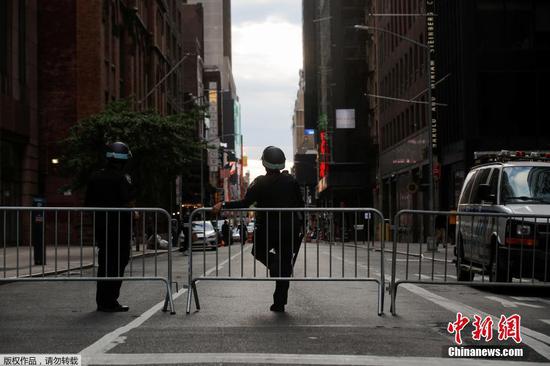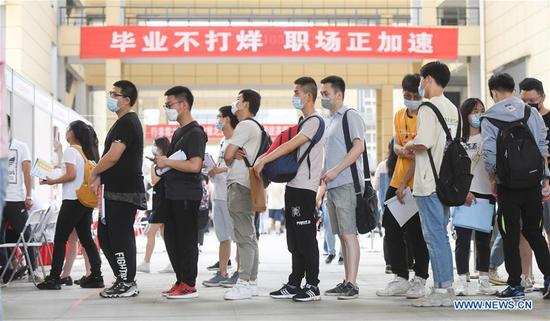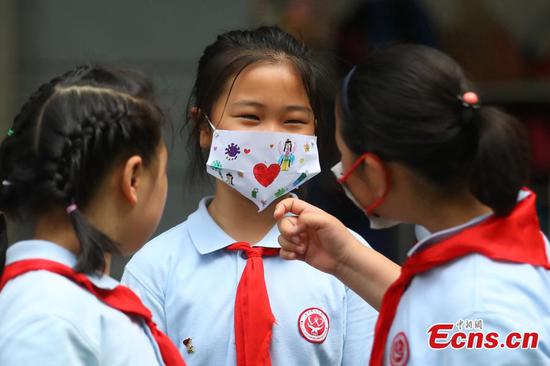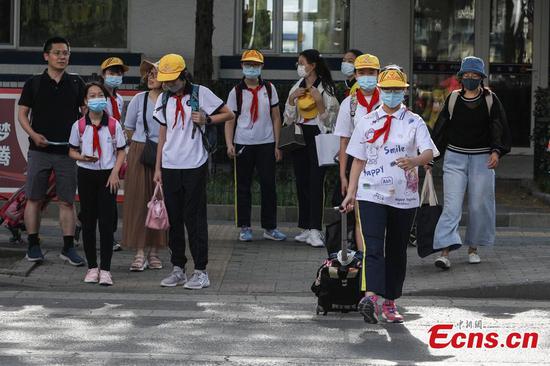
People visit a street crowded with small businesses in Suining, Sichuan province, on Sunday night. Street vendors are returning to cities as the authorities unveiled supportive policies for the sector, aiming to help increase people's incomes and revive the economy hit by the COVID-19 outbreak. (LIU CHANGSONG/FOR CHINA DAILY)
Market traders and street vendors are making a comeback across China, and this time they find themselves equipped with a new set of digital skills essential to navigating the vast consumer market.
To revitalize mom and pop retail stands, in a move aimed at spurring domestic spending and stabilizing employment, the country's leading e-commerce platforms are lending a helping hand, offering services from inventory support to accessible financing backed by technologies.
Domestic wholesale site 1688.com is among the first group of tech players with such offerings. At the heart of the action plan is an effort to link street vendors directly with factories, effectively circumventing middlemen and saving time and costs.
According to general manager Wang Hai, the legion of small-scale merchants on the site has managed to gain the upper hand in price negotiations, while manufacturers are more willing to mass-produce as the economy of scale serves to trim costs, thus creating a win-win situation.
"Data analytics also kicks in, giving traders a sneak peak of current consumer trends so that they no longer need to operate their business purely based on intuition, and they can avoid stockpiling," Wang said.
For instance, the most sought-after categories in markets are daily necessities, underwear, digital gadgets and beauty products, according to the company, whereas the most fervent buyers come from Guangdong, Zhejiang and Jiangsu provinces.
On the financial front, 1688's parent Alibaba Group is offering interest-free loans worth a total of 70 billion yuan ($9.85 billion), with which qualified merchants can purchase merchandise in bulk. Risk assessment for each applicant is conducted by sister service Mybank.
The string of moves comes as Premier Li Keqiang has called for developing markets and mom and pop stores, saying that they serve as important vehicles to create employment and inject vitality into China's growth. Markets, enterprises and individual merchants will be given full play and full government support, he said during a recent visit to Yantai, Shandong province.
Meanwhile, e-commerce major JD.com has pledged to secure quality merchandise worth over 50 billion yuan and is offering each stall keeper up to 100,000 yuan worth of interest-free loans for the purpose of replenishing their stock.
To stabilize employment, JD vowed to add a number of job positions that either require flexible working hours, allow working from home or are designed to foster startup businesses. For posts related to logistics, delivery, warehouse management and packaging, priority is given to people from poverty-stricken areas.
"The novel coronavirus outbreak will accelerate the digital transformation of the real economy, and individual traders and smaller stores are no exception," said Xu Lei, CEO of JD's retail unit. "We have the capability and, more importantly, the responsibility to inject vitality into these entities, thus contributing to the economic rebound and stabilizing employment."
Over at retailer Suning, a project dubbed "Night Shopping Partners" has entitled nighttime stall operators to apply for free cold chain refrigerated inventory services from nearby Carrefour stores and about 10,000 Suning Small stores. Suning acquired an 80 percent stake in Carrefour China last year.
Apart from merchandise supply support and a 2 billion yuan startup fund and low-interest loans, Suning pledged to offer free livestreaming resources, training and 1 billion yuan worth of subsidies.
Beijing has emphasized jobs would take priority this year and has set a target of adding 9 million urban jobs. Keeping people employed serves to ensure social stability and maintain growth in an economy set to rely more on domestic consumption, said Denis Depoux, global managing director at consulting firm Roland Berger.
"At this point in time, the best a government can do is to create a more flexible environment, such as (encouraging) flexible work formats and relieving the burden of hiring," Depoux said.
Meanwhile, especially during the crisis, digitization also plays a big role by creating connectivity and protecting businesses through developing new models, he noted. "We are definitely seeing the move from the 'sharing economy' to the 'digital proximity economy'."


















































